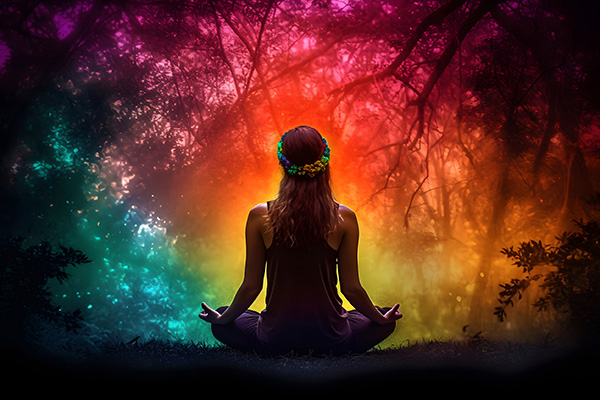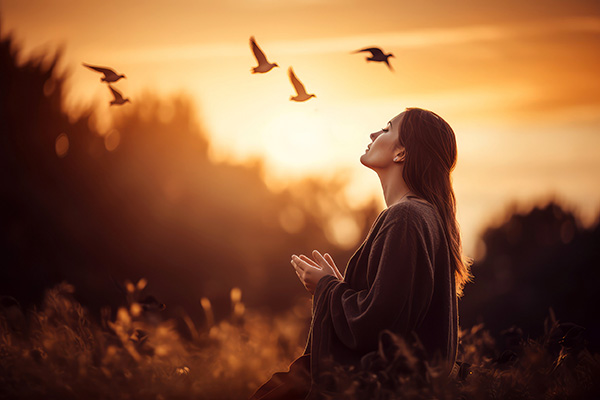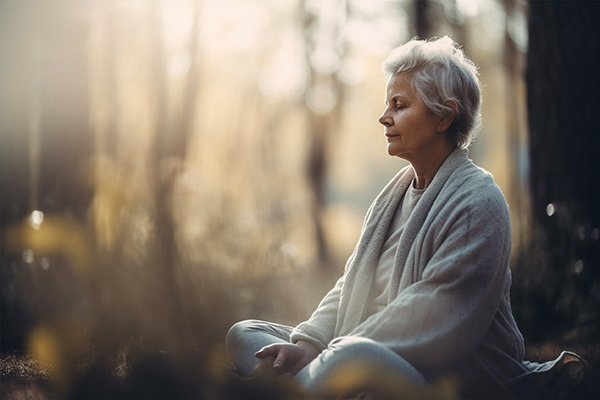The Manifesting Power Of Mindful Mornings
 Mornings are special. The energy of the morning is different than at any other time. When the sunlight is still fresh and gentle, the world is calm and quiet, there is a magic to this time. There is a softness that invites clarity, a gentle nudge from the universe to begin again, to step into a new day with intention and grace.
Mornings are special. The energy of the morning is different than at any other time. When the sunlight is still fresh and gentle, the world is calm and quiet, there is a magic to this time. There is a softness that invites clarity, a gentle nudge from the universe to begin again, to step into a new day with intention and grace.
The first few moments of our day help to set the tone for our experiences throughout. Becoming aware and attuned to this fresh universal energy can be as simple as creating a small morning routine.
Now, I realize not everyone loves the morning as much as I do. If this is the case for you, the idea of creating a morning routine may not sound appealing at all. Starting with small, quick steps can make all the difference here.
Your morning routine is meant to set you up for success. It is about doing things you like in the morning, that get you in the right frame of mind and heart.
Bringing a bit of mindfulness into your morning can set you up energetically to respond more effectively to your experiences throughout the day.
Below is a list of things you can do in the morning to create a personalized routine that works for you. You certainly don’t have to do all them! Just pick one or two to get started and build from there. While consistency is important, if something is not working for you, change it up and try something new. This routine should be fulfilling and meaningful to you.
Nurture Your Body To Boost Your Spirit
 When we think of spiritual practices, we generally focus on activities like meditation, prayer, energy healing, or divination.
When we think of spiritual practices, we generally focus on activities like meditation, prayer, energy healing, or divination.
While these are all important, we sometimes overlook a crucial pillar of our spiritual groth and well-being: caring for our physical body.
The body that carries us through life is sacred. The familiar phrase, “My body is my temple,” contains a profound truth.
When we treat our body with love, intention, and reverence, it naturally supports the expansion of our spiritual awareness and soul evolution.
Our body is how we experience the world. It’s easy to overvalue the mind alone, but the brain is also part of the physical body.
Without nurturing our physical well-being, our cognitive and intuitive functions can falter. The clearer and more vital our physical state, the more clarity and depth we bring to every level of our consciousness.
At some point on our spiritual path, we are called to care deeply for our physical body. What this looks like varies from person to person. Of course, if you’re dealing with any health concerns, it’s essential to see a qualified healthcare provider.
However, you don’t need to overhaul your life to get started. You can start by attending to your physical wellness with simple changes like drinking more water, moving your body daily, limiting screen time, enjoying time in nature, and choosing nourishing foods.
The Four Levels Of Relationship Connection
 Every so often, we meet someone who lights us up in an undeniably powerful way. These connections are rare, but when they happen, we sense their potential to become a significant part of our lives.
Every so often, we meet someone who lights us up in an undeniably powerful way. These connections are rare, but when they happen, we sense their potential to become a significant part of our lives.
But that initial spark can sometimes give way to doubt, especially in romantic relationships. As we get to know someone more intimately, we may wonder if the connection we felt initially was meaningful or just a passing fancy?
So, what’s really going on here? What are these dynamics trying to reveal? How can we assess these bonds more practically to determine if we want to be with someone long term?
At the heart of it, there are four fundamental levels on which we connect with others. When deciding whether to invest our energy in a relationship, we must consider all four levels.
A connection based on only one dimension often feels incomplete or out of sync. Typically, we need at least two levels of alignment to feel a genuine bond.
Three levels create a profound sense of harmony. When all four levels are in sync, the connection can feel magical. The connection can feel nothing short of magical.
Exploring our relationships through this lens empowers us to make more conscious choices. We gain clarity about what matters to us and how we experience connection. This approach also helps us cultivate gratitude for the unique ways others connect with us and appreciate the different flavors of intimacy that each level brings.
Manifest Your Best Life While You Learn To Meditate
 Meditation is an ancient, time-tested practice that offers remarkable health benefits that can profoundly impact our overall well-being and happiness.
Meditation is an ancient, time-tested practice that offers remarkable health benefits that can profoundly impact our overall well-being and happiness.
It can also shape our daily reality in powerful ways. A regular meditation practice can improve your ability to manifest your wishes and desires.
Meditation is a conduit for life-altering experiences with seld and spirit. It opens a line of communication with the universe that is both thrilling and comfortingly familiar. It offers wisdom, clarity, and peace, inviting you into a deeper relationship with your own divinity.
Unfortunately, many people struggle to make meditation a daily habit because it challenges modern habits of constant stimulation and relentless productivity. In a society that values busyness, the idea of “sitting still” or “doing nothing” can feel strange or uncomfortable to many.
Another major barrier is the common misconception that meditation requires a completely “cleared mind.” This sets an unrealistic expectation.
When you consider daily distractions, lack of time, and uncertainty about how to begin, it’s easy to see why so many people don’t meditate. However, the beauty of meditation is that it meets you where you are, and no perfection is required.
One of the most enduring myths about meditation is the belief that your success hinges on completely clearing your mind and eliminating all thoughts. In reality, this is just one type of meditation, and it’s a particularly difficult one to master!
The Transformative Power Of Finding Your Faith
 Faith is deeply personal and means different things to different people. It can take many forms, such as spiritual faith in a higher power, personal faith in one’s abilities, or faith in the people and principles that shape our lives.
Faith is deeply personal and means different things to different people. It can take many forms, such as spiritual faith in a higher power, personal faith in one’s abilities, or faith in the people and principles that shape our lives.
For some, faith is a guiding force that offers comfort and meaning. For others, it’s a leap into the unknown, choosing hope over doubt. It can be rooted in a religious tradition, philosophical principle, esoteric teaching, or the simple belief that tomorrow holds possibilities unseen today.
Whatever our beliefs, faith is an intense and often unshakable certainty in those beliefs despite the absence of proof. To me, faith is a powerful, transformative force. When embraced, it offers immeasurable strength in the face of life’s challenges.
When I was young, I struggled to grasp the concept of faith. I never doubted the existence of a creator. I never doubted an afterlife or the presence of spirits in our lives. Perhaps this was due to my innate sensitivity to energies and spiritual disposition. I moved through life guided by intuition.
Yet despite my spiritual grounding, my faith was tested repeatedly, especially through experiences of trauma and loss.
I wrestled with questions of purpose and fairness. I couldn’t accept the idea of a cruel or indifferent creator who randomly punished or rewarded people.


